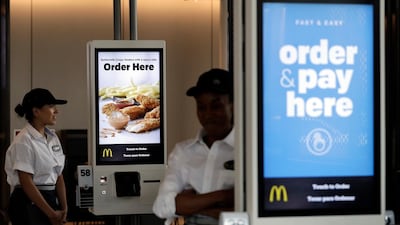Landing on Dynamic Yield’s website is a quick lesson in how easy it is for companies to monitor online user behaviour these days. The homepage tells visitors what country they are in, the weather forecast in that location, the operating system of the computer being used to browse, and where a visitor came from – whether Google, Facebook or the like - to arrive at its website.
The information is Dynamic Yield saying to prospective customers, “Hey, we see you” – and it is a swift demonstration in the power of personalisation to attract customers.
Dynamic Yield’s ability to personalise content caught McDonald’s attention.
The American fast food giant bought Dynamic Yield for a reported $300 million in March, the company’s biggest acquisition in 20 years. The restaurant chain, which has 38,000 stores, is now the sole owner of Dynamic Yield.
Steven Easterbrook, McDonald’s chief executive, says that technology is a critical part of McDonald’s growth, and it plans to use Dynamic Yield for “creating more personalised experiences for our customers”.
The algorithms in Dynamic Yield’s “decision logic” technology were tested at a McDonald’s restaurant in Miami, Florida, where menu items were suggested to customers based on factors such as weather and traffic.
On a muggy Miami day, digital menus might show ice cream and iced coffee as recommendations, for example; or the technology might serve up Happy Meals at school pick-up times to tired parents at a drive-thru. Where restaurants might have depended on savvy managers to push such recommendations before, Dynamic Yield’s algorithms can do it instantly and across hundreds of locations, and even pick up on trends in international markets and introduce them at a local restaurant.
Speaking exclusively to The National, Dynamic Yield's co-founder and chief executive Liad Agmon says his company will remain an independent company even after McDonald's takes over.
“All our employees are staying, we continue working with all of our customers and partners, and [we] will continue our independent global growth plan,” he said. The company’s clients include Ikea, William Hill, HelloFresh, Urban Outfitters and Sephora, among others.
But what is the technology - decision logic - that made Dynamic Yield so valuable?
Omar Akhtar, a digital marketing analyst based in San Francisco, says brands have used decision logic in digital advertising since around 2011 and have gone on to implement the technology to deliver personalised experiences or messages.
“Decision logic is simply using a set of rules to deliver customised pathways, content or experiences to a customer. In a nutshell, it’s digital personalisation.
“Zappos, a footwear company, sends you personalised recommendations for shoes you might like based on your searches, Netflix recommends movies and TV shows that match your taste, airlines change the background images of their websites depending on the destinations you are searching tickets for, the use cases are endless.”
Indeed, the algorithms that underpin decision logic powers some of the biggest names in business today, with industries as diverse as e-commerce, financial services, travel, gaming and media implementing decision logic - the core of Dynamic Yield’s offering.
Netflix’s VP of innovation, Carlos Gomez-Uribe, has said the evolution of Netflix will approach a time when the app will automatically start playing a show or movie the instant the app is opened, it will be so confident in its users’ preferences.
Part of the power of recommendations is that it can personalise a user’s experience, which can boost time spent on websites and can lead to higher purchasing rates and greater customer satisfaction.
“Our technology simplifies the process in which companies gather, analyse and activate their data,” explains Mr Agmon.
As Dynamic Yield employs machine-learning, meaning the technology adapts to new information as it goes, there might also arise unexpected benefits as the technology unpacks the data generated by billions of orders, something that McDonald’s - with its 69 million daily customers - will be able to supply.
Dynamic Yield has its competitors that also operate in this niche field.
Marco Kloots, the chief executive of Dutch decision logic company Platform161, says that as more devices, screens and media become internet-connected, they become programmable.
“So, for example, one of the ways McDonalds might use the Dynamic Yield tech might be used to customise its drive-thru experiences, or ordering-screens in branch, based on location, or many other types of live factors.”
But the tools that are used are not limited to a specific industry, says Mr Agmon, referring to personalisation technology as “industry agnostic”.
“The use cases or applications might change from e-commerce to financial services to travel, where the products and services are very different, but the overall goal of providing more tailored interactions with the user has proven relevant and possible for all,” he says.
And now, bricks-and-mortar companies like McDonald’s are seeking to gain the upper hand with the use of the technology.
“What has changed in recent times, with the rise of digital in particular is the ability for brands to apply all kinds of real-time data to everything they do,” says Mr Kloots. “Whether you call it targeting or personalisation, or even ‘people-based marketing’, this is the type of approach that competitors are taking, even if you don’t.”

